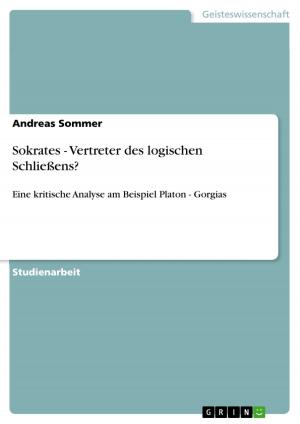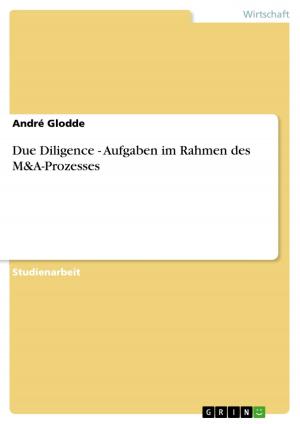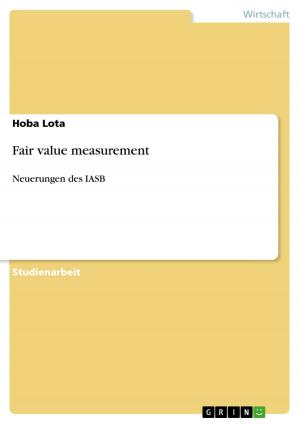Comparison and contrast of the operations strategy of two 'manufacturing firms' with two 'service' firms
Business & Finance, Management & Leadership, Management| Author: | Markus Baum | ISBN: | 9783656196006 |
| Publisher: | GRIN Verlag | Publication: | May 22, 2012 |
| Imprint: | GRIN Verlag | Language: | English |
| Author: | Markus Baum |
| ISBN: | 9783656196006 |
| Publisher: | GRIN Verlag |
| Publication: | May 22, 2012 |
| Imprint: | GRIN Verlag |
| Language: | English |
Scientific Essay from the year 2011 in the subject Business economics - Business Management, Corporate Governance, The University of Surrey (School of Management ), course: Production and Operations Management , language: English, abstract: INTRODUCTION: The purpose of this paper is to compare and contrast the operations strategy of two 'manufacturing firms' with two 'service' firms and to evaluate the order qualifying and order winning criteria. Operations strategy is one part of an enterprise's overall strategy (corporate strategy, business strategy and operational strategy) and defines the enterprise adjustment concerning 'core competencies, capabilities and processes, technologies, resources and key tactical activities necessary in any supply network, in order to create and deliver products or services and the value demanded by a customer' (Lowson, 2001). CONCLUSION: The analysis of two manufacturing (Dell, Zara) and two service firms (Lufthansa, McDonalds) shows the correspondence between the theoretical approach of operations management and current practice. Each company has a whole enterprise strategy that includes the operations strategy. Each industry has different order qualifiers, but no company analyzed was able to be the best in all qualifiers, which supports the theoretical conclusion that fulfilling all objectives simultaneously, is impossible (Skinner, 1969). AUTHOR: Markus Baum is Group Finance Director at a management consulting (Germany) firm with focus on business strategy, supply chain management (SCM), manufacturing & logistics, sourcing & purchasing, marketing & sales, financial management and information technology (IT-strategy). The company has subsidiaries in Germany, Switzerland, Belgian, France, United Kingdom and Russia. Markus Baum earned a MBA with distinction from the University of Surrey (UK), is an international certified accountant, has and graduation in accounting & controlling and an apprenticeship as tax adviser assistant. Markus Baum is a member of the International Controlling Association.
Scientific Essay from the year 2011 in the subject Business economics - Business Management, Corporate Governance, The University of Surrey (School of Management ), course: Production and Operations Management , language: English, abstract: INTRODUCTION: The purpose of this paper is to compare and contrast the operations strategy of two 'manufacturing firms' with two 'service' firms and to evaluate the order qualifying and order winning criteria. Operations strategy is one part of an enterprise's overall strategy (corporate strategy, business strategy and operational strategy) and defines the enterprise adjustment concerning 'core competencies, capabilities and processes, technologies, resources and key tactical activities necessary in any supply network, in order to create and deliver products or services and the value demanded by a customer' (Lowson, 2001). CONCLUSION: The analysis of two manufacturing (Dell, Zara) and two service firms (Lufthansa, McDonalds) shows the correspondence between the theoretical approach of operations management and current practice. Each company has a whole enterprise strategy that includes the operations strategy. Each industry has different order qualifiers, but no company analyzed was able to be the best in all qualifiers, which supports the theoretical conclusion that fulfilling all objectives simultaneously, is impossible (Skinner, 1969). AUTHOR: Markus Baum is Group Finance Director at a management consulting (Germany) firm with focus on business strategy, supply chain management (SCM), manufacturing & logistics, sourcing & purchasing, marketing & sales, financial management and information technology (IT-strategy). The company has subsidiaries in Germany, Switzerland, Belgian, France, United Kingdom and Russia. Markus Baum earned a MBA with distinction from the University of Surrey (UK), is an international certified accountant, has and graduation in accounting & controlling and an apprenticeship as tax adviser assistant. Markus Baum is a member of the International Controlling Association.















